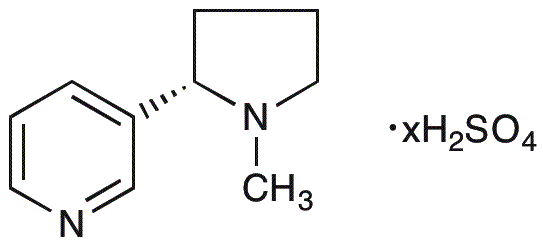Nicotine sulfate (40-45% in water as Nicotine base) is widely utilized in research focused on:
- Pest Control: Used as an effective insecticide in agriculture, nicotine sulfate targets pests like aphids and whiteflies, providing a natural alternative to synthetic chemicals.
- Research in Neurobiology: Serves as a tool in studies exploring the effects of nicotine on the nervous system, helping researchers understand addiction and neurodegenerative diseases.
- Pharmaceutical Development: Acts as a precursor in the synthesis of various nicotine-based pharmaceuticals, aiding in the development of smoking cessation products.
- Biochemical Studies: Utilized in laboratory settings to investigate the biochemical pathways influenced by nicotine, contributing to advancements in drug discovery.
- Ecotoxicology Assessments: Employed in studies assessing the environmental impact of nicotine and its derivatives, helping to evaluate risks associated with its use in agriculture.
General Information
Properties
Safety and Regulations
Applications
Nicotine sulfate (40-45% in water as Nicotine base) is widely utilized in research focused on:
- Pest Control: Used as an effective insecticide in agriculture, nicotine sulfate targets pests like aphids and whiteflies, providing a natural alternative to synthetic chemicals.
- Research in Neurobiology: Serves as a tool in studies exploring the effects of nicotine on the nervous system, helping researchers understand addiction and neurodegenerative diseases.
- Pharmaceutical Development: Acts as a precursor in the synthesis of various nicotine-based pharmaceuticals, aiding in the development of smoking cessation products.
- Biochemical Studies: Utilized in laboratory settings to investigate the biochemical pathways influenced by nicotine, contributing to advancements in drug discovery.
- Ecotoxicology Assessments: Employed in studies assessing the environmental impact of nicotine and its derivatives, helping to evaluate risks associated with its use in agriculture.
Documents
Safety Data Sheets (SDS)
The SDS provides comprehensive safety information on handling, storage, and disposal of the product.
Product Specification (PS)
The PS provides a comprehensive breakdown of the product’s properties, including chemical composition, physical state, purity, and storage requirements. It also details acceptable quality ranges and the product's intended applications.
Certificates of Analysis (COA)
Search for Certificates of Analysis (COA) by entering the products Lot Number. Lot and Batch Numbers can be found on a product’s label following the words ‘Lot’ or ‘Batch’.
*Catalog Number
*Lot Number
Certificates Of Origin (COO)
This COO confirms the country where the product was manufactured, and also details the materials and components used in it and whether it is derived from natural, synthetic, or other specific sources. This certificate may be required for customs, trade, and regulatory compliance.
*Catalog Number
*Lot Number
Safety Data Sheets (SDS)
The SDS provides comprehensive safety information on handling, storage, and disposal of the product.
DownloadProduct Specification (PS)
The PS provides a comprehensive breakdown of the product’s properties, including chemical composition, physical state, purity, and storage requirements. It also details acceptable quality ranges and the product's intended applications.
DownloadCertificates of Analysis (COA)
Search for Certificates of Analysis (COA) by entering the products Lot Number. Lot and Batch Numbers can be found on a product’s label following the words ‘Lot’ or ‘Batch’.
*Catalog Number
*Lot Number
Certificates Of Origin (COO)
This COO confirms the country where the product was manufactured, and also details the materials and components used in it and whether it is derived from natural, synthetic, or other specific sources. This certificate may be required for customs, trade, and regulatory compliance.


